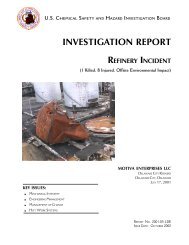Little General Store Propane Explosion - US Chemical Safety and ...
Little General Store Propane Explosion - US Chemical Safety and ...
Little General Store Propane Explosion - US Chemical Safety and ...
You also want an ePaper? Increase the reach of your titles
YUMPU automatically turns print PDFs into web optimized ePapers that Google loves.
<strong>Little</strong> <strong>General</strong> <strong>Store</strong> September 2008<br />
10. The junior propane service technician who was servicing to the tank on the day of the incident had no<br />
formal training <strong>and</strong> did not recognize the defect in the withdrawal valve. He was also working alone<br />
even though he had been on the job for only one <strong>and</strong> a half months.<br />
11. <strong>Propane</strong> service technicians commonly do not receive emergency response training.<br />
12. The propane industry’s primary training curriculum (the Certified Employee Training Program)<br />
consists of procedures <strong>and</strong> materials for performing routine (non-emergency) tasks only.<br />
13. The Occupational <strong>Safety</strong> <strong>and</strong> Health Administration’s <strong>and</strong> National Fire Protection Association’s<br />
propane st<strong>and</strong>ards require training but do not include curricula, practical exercises, emergency<br />
actions, or knowledge evaluation tools.<br />
14. A propane emergency significant enough for fire department response is reported nearly everyday in<br />
the United States. Only gasoline <strong>and</strong> natural gas are involved in more hazardous materials<br />
emergencies.<br />
15. 911 operators in the United States lack propane emergency guidance to help them collect important<br />
information from callers, offer life-saving advice, <strong>and</strong> convey relevant information to first responders.<br />
16. Minimal information on the nature of the incident was exchanged between the propane service<br />
technician <strong>and</strong> the 911 operator. Therefore, the only information the 911 operator provided the Ghent<br />
Volunteer Fire Department responders was the incident location <strong>and</strong> the “report of a propane leak.”<br />
17. Firefighters in West Virginia are required to attend a minimum of four hours of hazardous materials<br />
emergency response training as part of their initial training sequence but refresher training is not<br />
required. The responding Ghent Volunteer Fire Department captain last attended a hazardous<br />
materials response course in 1998.<br />
18. <strong>Propane</strong> safety <strong>and</strong> emergency training is voluntary for fire department personnel in West Virginia.<br />
None of the responders from the Ghent Volunteer Fire Department had specific training relating to<br />
propane emergencies.<br />
52









